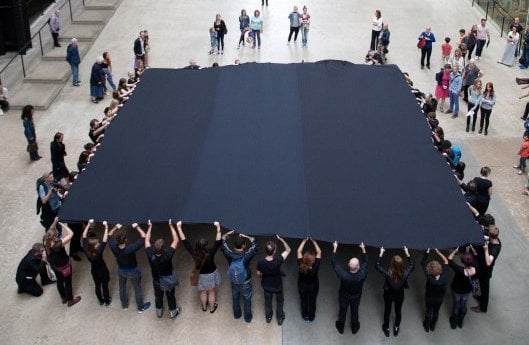
Liberate Tate's performance of 'Hidden Figures' at Tate
Photo: Martin LeSanto-Smith 2015
Sponsorship in the spotlight
Following the ruling that Tate should disclose the details of its BP sponsorship, Anna Galkina explains why arts organisations must choose their commercial partners carefully.
On 22 December the UK Information Tribunal ruled Tate galleries must disclose the sums of BP sponsorship through the years 1990 to 2006, as well as some details of internal decision-making on the sponsorship deal. The Independent described the ruling as “embarrassing” and a “landmark victory” for campaigners like myself. On the other hand, Tiffany Jenkins, writing for Spiked! (and reposted in AP), charges us with posing a “threat to the arts” by pushing for sponsorship figures to be disclosed.
The commercialisation of art is really what is at issue when Tate claims commercial secrecy
To understand the arguments about disclosure of funding information, we need to talk about what corporate sponsorship of the arts actually does. In PR industry terms, what BP gets out of funding Tate is called a ‘social licence to operate’. In the mid 1990s, several high-profile scandals (including the execution of Ken Saro-Wiwa, Shell’s plans to sink offshore oil rig Brent Spar and BP’s financing of paramilitary ‘death squads’ in Colombia) undermined public perception of the industry. With their reputation and staff morale seriously damaged, oil giants BP and Shell changed tack. Oil companies did not need to advertise their product (petrol) as customers would buy it anyway. The new PR strategy was to reach ‘special publics’ – key elites including civil servants, financial investors, journalists, academics, politicians, NGOs and cultural commentators. The Information Tribunal’s ruling states: “Arts sponsorship can legitimately be understood as a means of maintaining BP’s ‘social licence’ to operate and of enhancing, maintaining or repairing BP’s brand.”
Association with high-profile cultural spaces earns the company recognition and gratitude among opinion-formers. They might begin to assume that cultural institutions would struggle without BP or Shell’s support, so in other words, oil is indispensable. Art collective Liberate Tate writes: “Oil sponsorship of the arts is an act of anaesthesia, something that numbs us, stops us perceiving the reality of fossil fuel extraction. It is the opposite of an aesthetic act, since aesthetics should enable us to feel the world, to sense what it truly happening deep within our guts.”
This is where the figures come in. From currently publicly available information, we estimate that BP’s sponsorship of Tate is worth about £500,000 a year, or less than 0.5% of Tate’s annual budget. If the public knows how much Tate receives from BP, we can judge just how indispensable BP actually is. Oil funding is in the spotlight because of the urgency of climate change. Archbishop Desmond Tutu recently likened the tactics to urgently tackle the world’s fossil fuel dependency to those that brought down apartheid in South Africa: “People of conscience need to break their ties with corporations financing the injustice of climate change… We can encourage more of our universities and municipalities and cultural institutions to cut their ties to the fossil fuel industry.”
But beyond the specifics of the BP case, this is actually an argument about what art itself does. With the government cutting 30% of Arts Council England’s funding between 2011 and 2015 and its policy to prioritise developing private sources of funding, artists are encouraged to think and act as entrepreneurs. They now have to sell art and associated cultural credibility (social licence) on the marketplace, use market-based cost-cutting measures (the privatisation of two thirds of the jobs at National Gallery is a case in point) and keep a strict separation between (public) artwork and (private) sources of funding. The commercialisation of art is really what is at issue when Tate claims commercial secrecy at the tribunal.
Art can be more than a product. Funding is part of the work of art alongside the stuff that is displayed in a gallery or performed on stage. Every arts organisation needs to make individual choices about what funding it finds acceptable, but we as artists and arts organisations can also take collective responsibility for the future we create by rejecting corporatisation, by working to protect public funding and by holding ourselves accountable for what our art and its financing does in the world.
Anna Galkina is a campaigner at Platform.
platformlondon.org
@annatation
Take the money and run? – an event about ethics, funding and art – will take place on Thursday 29 January, at Toynbee Studios, London. Produced and presented by the Live Art Development Agency, Artsadmin, Home Live Art and Platform, it will include presentations, provocations and discussions by artists, activists, academics, producers and journalists looking at the challenges of fundraising ethically and a range of strategies we might consider for the future. The event features live, remote, recorded and written contributions from Clara Paillard, Dave Beech, Rachel Spence, Mel Evans, Eriel Deranger, Kelli McCluskey, Mark Ravenhill, Jess Worth, Jen Harvie, Judith Knight, David Cross, Glen Tarman, and Ackroyd & Harvey.
Join the Discussion
You must be logged in to post a comment.